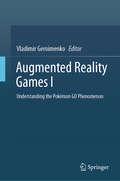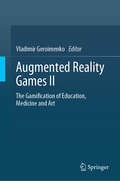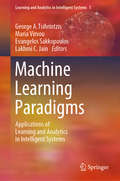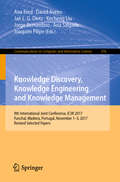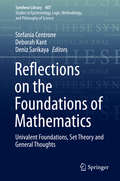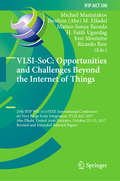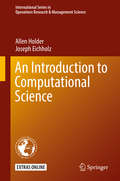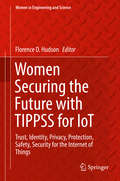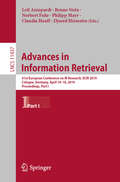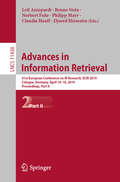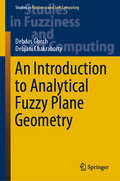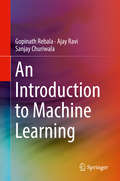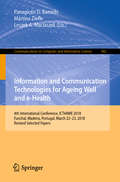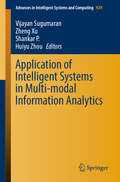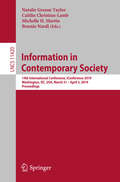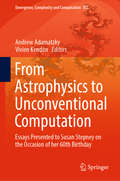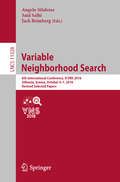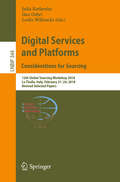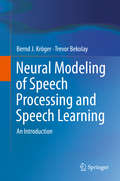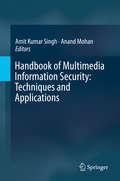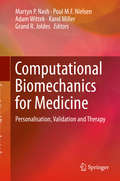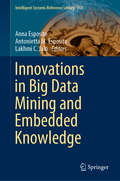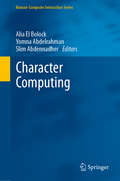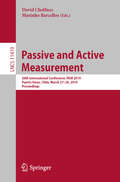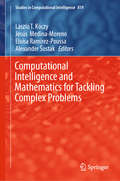- Table View
- List View
Augmented Reality Games I: Understanding the Pokémon GO Phenomenon
by Vladimir GeroimenkoThis is the first of two comprehensive volumes that provide a thorough and multi-faceted research into the emerging field of augmented reality games and consider a wide range of its major issues. These first ever research monographs on augmented reality games have been written by a team of 70 leading researchers, practitioners and artists from 20 countries. In Volume I, the phenomenon of the Pokémon GO game is analysed in theoretical, cultural and conceptual contexts, with emphasis on its nature and the educational use of the game in children and adolescents. Game transfer phenomena, motives for playing Pokémon GO, players’ experiences and memorable moments, social interaction, long-term engagement, health implications and many other issues raised by the Pokémon GO game are systematically examined and discussed. Augmented Reality Games I is essential reading not only for researchers, practitioners, game developers and artists, but also for students (graduates and undergraduates) and all those interested in the rapidly developing area of augmented reality games.
Augmented Reality Games II: The Gamification of Education, Medicine and Art
by Vladimir GeroimenkoThis is the second of two comprehensive volumes that provide a thorough and multi-faceted research into the emerging field of augmented reality games and consider a wide range of its major issues. These first ever research monographs on augmented reality games have been written by a team of 70 leading researchers, practitioners and artists from 20 countries. Volume II explores the most important and challenging issues that have been raised by the use of the Augmented Reality approach and technology in the gamification of education, healthcare, medicine and art. The volume deals with a systematic analysis of educational augmented reality games, their use for health promotion in old age and for improving people’s well-being, the gamification of augmented reality art and immersive reading experiences, among other topics. Augmented Reality Games II is essential reading not only for researchers, practitioners, game developers and artists, but also for students (graduates and undergraduates) and all those interested in the rapidly developing area of augmented reality games.
Machine Learning Paradigms: Applications of Learning and Analytics in Intelligent Systems (Learning and Analytics in Intelligent Systems #1)
by George A. Tsihrintzis Maria Virvou Evangelos Sakkopoulos Lakhmi C. JainThis book is the inaugural volume in the new Springer series on Learning and Analytics in Intelligent Systems. The series aims at providing, in hard-copy and soft-copy form, books on all aspects of learning, analytics, advanced intelligent systems and related technologies. These disciplines are strongly related and mutually complementary; accordingly, the new series encourages an integrated approach to themes and topics in these disciplines, which will result in significant cross-fertilization, research advances and new knowledge creation. To maximize the dissemination of research findings, the series will publish edited books, monographs, handbooks, textbooks and conference proceedings. This book is intended for professors, researchers, scientists, engineers and students. An extensive list of references at the end of each chapter allows readers to probe further into those application areas that interest them most.
Knowledge Discovery, Knowledge Engineering and Knowledge Management: 9th International Joint Conference, IC3K 2017, Funchal, Madeira, Portugal, November 1-3, 2017, Revised Selected Papers (Communications in Computer and Information Science #976)
by Ana Fred David Aveiro Jan L. Dietz Kecheng Liu Jorge Bernardino Ana Salgado Joaquim FilipeThis book constitutes the thoroughly refereed proceedings of the 8th International Joint Conference on Knowledge Discovery, Knowledge Engineering and Knowledge Management, IC3K 2017, held in Funchal, Madeira, Portugal, in November 2017.The 19 full papers presented were carefully reviewed and selected from 157 submissions. The papers are organized in topical sections on knowledge discovery and information retrieval; knowledge engineering and ontology development; and knowledge management and information sharing.
Reflections on the Foundations of Mathematics: Univalent Foundations, Set Theory and General Thoughts (Synthese Library #407)
by Stefania Centrone Deborah Kant Deniz SarikayaThis edited work presents contemporary mathematical practice in the foundational mathematical theories, in particular set theory and the univalent foundations. It shares the work of significant scholars across the disciplines of mathematics, philosophy and computer science. Readers will discover systematic thought on criteria for a suitable foundation in mathematics and philosophical reflections around the mathematical perspectives.The volume is divided into three sections, the first two of which focus on the two most prominent candidate theories for a foundation of mathematics. Readers may trace current research in set theory, which has widely been assumed to serve as a framework for foundational issues, as well as new material elaborating on the univalent foundations, considering an approach based on homotopy type theory (HoTT). The third section then builds on this and is centred on philosophical questions connected to the foundations of mathematics. Here, the authors contribute to discussions on foundational criteria with more general thoughts on the foundations of mathematics which are not connected to particular theories.This book shares the work of some of the most important scholars in the fields of set theory (S. Friedman), non-classical logic (G. Priest) and the philosophy of mathematics (P. Maddy). The reader will become aware of the advantages of each theory and objections to it as a foundation, following the latest and best work across the disciplines and it is therefore a valuable read for anyone working on the foundations of mathematics or in the philosophy of mathematics.
VLSI-SoC: 25th IFIP WG 10.5/IEEE International Conference on Very Large Scale Integration, VLSI-SoC 2017, Abu Dhabi, United Arab Emirates, October 23–25, 2017, Revised and Extended Selected Papers (IFIP Advances in Information and Communication Technology #500)
by Michail Maniatakos Ibrahim Abe Elfadel Matteo Sonza Reorda H. Fatih Ugurdag José Monteiro Ricardo ReisThis book contains extended and revised versions of the best papers presented at the 25th IFIP WG 10.5/IEEE International Conference on Very Large Scale Integration, VLSI-SoC 2017, held in Abu Dhabi, United Arab Emirates, in August 2017. The 11 papers included in this book were carefully reviewed and selected from the 33 full papers presented at the conference. The papers cover a wide range of topics in VLSI technology and advanced research. They address the latest scientific and industrial results and developments as well as future trends in the field of System-on-Chip (SoC) Design. On the occasion of the silver jubilee of the VLSI-SoC conference series the book also includes a special chapter that presents the history of the VLSI-SoC series of conferences and its relation with VLSI-SoC evolution since the early 80s up to the present.
An Introduction to Computational Science (International Series in Operations Research & Management Science #278)
by Allen Holder Joseph EichholzThis textbook provides an introduction to the growing interdisciplinary field of computational science. It combines a foundational development of numerical methods with a variety of illustrative applications spread across numerous areas of science and engineering. The intended audience is the undergraduate who has completed introductory coursework in mathematics and computer science. Students gain computational acuity by authoring their own numerical routines and by practicing with numerical methods as they solve computational models. This education encourages students to learn the importance of answering: How expensive is a calculation, how trustworthy is a calculation, and how might we model a problem to apply a desired numerical method?The text is written in two parts. Part I provides a succinct, one-term inauguration into the primary routines on which a further study of computational science rests. The material is organized so that the transition to computational science from coursework in calculus, differential equations, and linear algebra is natural. Beyond the mathematical and computational content of Part I, students gain proficiency with elemental programming constructs and visualization, which are presented in MATLAB syntax. The focus of Part II is modeling, wherein students build computational models, compute solutions, and report their findings. The models purposely intersect numerous areas of science and engineering to demonstrate the pervasive role played by computational science.
Women Securing the Future with TIPPSS for IoT: Trust, Identity, Privacy, Protection, Safety, Security for the Internet of Things (Women in Engineering and Science)
by Florence D. HudsonThis book provides insight and expert advice on the challenges of Trust, Identity, Privacy, Protection, Safety and Security (TIPPSS) for the growing Internet of Things (IoT) in our connected world. Contributors cover physical, legal, financial and reputational risk in connected products and services for citizens and institutions including industry, academia, scientific research, healthcare and smart cities. As an important part of the Women in Science and Engineering book series, the work highlights the contribution of women leaders in TIPPSS for IoT, inspiring women and men, girls and boys to enter and apply themselves to secure our future in an increasingly connected world. The book features contributions from prominent female engineers, scientists, business and technology leaders, policy and legal experts in IoT from academia, industry and government.Provides insight into women’s contributions to the field of Trust, Identity, Privacy, Protection, Safety and Security (TIPPSS) for IoTPresents information from academia, research, government and industry into advances, applications, and threats to the growing field of cybersecurity and IoTIncludes topics such as hacking of IoT devices and systems including healthcare devices, identity and access management, the issues of privacy and your civil rights, and more
Advances in Information Retrieval: 41st European Conference on IR Research, ECIR 2019, Cologne, Germany, April 14–18, 2019, Proceedings, Part I (Lecture Notes in Computer Science #11437)
by Leif Azzopardi Benno Stein Norbert Fuhr Philipp Mayr Claudia Hauff Djoerd HiemstraThis two-volume set LNCS 11437 and 11438 constitutes the refereed proceedings of the 41st European Conference on IR Research, ECIR 2019, held in Cologne, Germany, in April 2019. The 48 full papers presented together with 2 keynote papers, 44 short papers, 8 demonstration papers, 8 invited CLEF papers, 11 doctoral consortium papers, 4 workshop papers, and 4 tutorials were carefully reviewed and selected from 365 submissions. They were organized in topical sections named: Modeling Relations; Classification and Search; Recommender Systems; Graphs; Query Analytics; Representation; Reproducibility (Systems); Reproducibility (Application); Neural IR; Cross Lingual IR; QA and Conversational Search; Topic Modeling; Metrics; Image IR; Short Papers; Demonstration Papers; CLEF Organizers Lab Track; Doctoral Consortium Papers; Workshops; and Tutorials.
Advances in Information Retrieval: 41st European Conference on IR Research, ECIR 2019, Cologne, Germany, April 14–18, 2019, Proceedings, Part II (Lecture Notes in Computer Science #11438)
by Leif Azzopardi Benno Stein Norbert Fuhr Philipp Mayr Claudia Hauff Djoerd HiemstraThis two-volume set LNCS 11437 and 11438 constitutes the refereed proceedings of the 41st European Conference on IR Research, ECIR 2019, held in Cologne, Germany, in April 2019. The 48 full papers presented together with 2 keynote papers, 44 short papers, 8 demonstration papers, 8 invited CLEF papers, 11 doctoral consortium papers, 4 workshop papers, and 4 tutorials were carefully reviewed and selected from 365 submissions. They were organized in topical sections named: Modeling Relations; Classification and Search; Recommender Systems; Graphs; Query Analytics; Representation; Reproducibility (Systems); Reproducibility (Application); Neural IR; Cross Lingual IR; QA and Conversational Search; Topic Modeling; Metrics; Image IR; Short Papers; Demonstration Papers; CLEF Organizers Lab Track; Doctoral Consortium Papers; Workshops; and Tutorials.
An Introduction to Analytical Fuzzy Plane Geometry (Studies in Fuzziness and Soft Computing #381)
by Debdas Ghosh Debjani ChakrabortyThis book offers a rigorous mathematical analysis of fuzzy geometrical ideas. It demonstrates the use of fuzzy points for interpreting an imprecise location and for representing an imprecise line by a fuzzy line. Further, it shows that a fuzzy circle can be used to represent a circle when its description is not known precisely, and that fuzzy conic sections can be used to describe imprecise conic sections. Moreover, it discusses fundamental notions on fuzzy geometry, including the concepts of fuzzy line segment and fuzzy distance, as well as key fuzzy operations, and includes several diagrams and numerical illustrations to make the topic more understandable. The book fills an important gap in the literature, providing the first comprehensive reference guide on the fuzzy mathematics of imprecise image subsets and imprecise geometrical objects. Mainly intended for researchers active in fuzzy optimization, it also includes chapters relevant for those working on fuzzy image processing and pattern recognition. Furthermore, it is a valuable resource for beginners interested in basic operations on fuzzy numbers, and can be used in university courses on fuzzy geometry, dealing with imprecise locations, imprecise lines, imprecise circles, and imprecise conic sections.
An Introduction to Machine Learning
by Gopinath Rebala Ajay Ravi Sanjay ChuriwalaJust like electricity, Machine Learning will revolutionize our life in many ways – some of which are not even conceivable today. This book provides a thorough conceptual understanding of Machine Learning techniques and algorithms. Many of the mathematical concepts are explained in an intuitive manner. The book starts with an overview of machine learning and the underlying Mathematical and Statistical concepts before moving onto machine learning topics. It gradually builds up the depth, covering many of the present day machine learning algorithms, ending in Deep Learning and Reinforcement Learning algorithms. The book also covers some of the popular Machine Learning applications. The material in this book is agnostic to any specific programming language or hardware so that readers can try these concepts on whichever platforms they are already familiar with. Offers a comprehensive introduction to Machine Learning, while not assuming any prior knowledge of the topic;Provides a complete overview of available techniques and algorithms in conceptual terms, covering various application domains of machine learning;Not tied to any specific software language or hardware implementation.
Information and Communication Technologies for Ageing Well and e-Health: 4th International Conference, ICT4AWE 2018, Funchal, Madeira, Portugal, March 22–23, 2018, Revised Selected Papers (Communications in Computer and Information Science #982)
by Panagiotis D. Bamidis Martina Ziefle Leszek A. MaciaszekThis book constitutes the thoroughly refereed proceedings of the third International Conference on Communication Technologies for Ageing Well and e-Health, ICT4AWE 2018, held in Funchal, Madeira, Portugal in March 2018.The 10 full papers presented were carefully reviewed and selected from 32 submissions. The papers aim at contributing to the understanding of relevant trends of current research on ICT for Ageing Well and eHealth including the ambient assisted living.
Application of Intelligent Systems in Multi-modal Information Analytics (Advances in Intelligent Systems and Computing #929)
by Vijayan Sugumaran Zheng Xu Shankar P. Huiyu ZhouThis book presents the proceedings of the 2019 International Conference on Intelligent Systems Applications in Multi-modal Information Analytics, held in Shenyang, China on February 19-20, 2019. It provides comprehensive coverage of the latest advances and trends in information technology, science and engineering, addressing a number of broad themes, including data mining, multi-modal informatics, agent-based and multi-agent systems for health and education informatics, which inspire the development of intelligent information technologies. The contributions cover a wide range of topics: AI applications and innovations in health and education informatics; data and knowledge management; multi-modal application management; and web/social media mining for multi-modal informatics. Outlining promising future research directions, the book is a valuable resource for students, researchers and professionals, and provides a useful reference guide for newcomers to the field.
Information in Contemporary Society: 14th International Conference, iConference 2019, Washington, DC, USA, March 31–April 3, 2019, Proceedings (Lecture Notes in Computer Science #11420)
by Natalie Greene Taylor Caitlin Christian-Lamb Michelle H. Martin Bonnie NardiThis book constitutes the proceedings of the 14th International Conference on Information in Contemporary Society, iConference 2019, held in Washington, DC, USA, in March/April 2019. The 44 full papers and 33 short papers presented in this volume were carefully reviewed and selected from 133 submitted full papers and 88 submitted short papers. The papers are organized in the following topical sections: Scientific work and data practices; methodological concerns in (big) data research; concerns about “smart” interactions and privacy; identity questions in online communities; measuring and tracking scientific literature; limits and affordances of automation; collecting data about vulnerable populations; supporting communities through public libraries and infrastructure; information behaviors in academic environments; data-driven storytelling and modeling; online activism; digital libraries, curation and preservation; social-media text mining and sentiment analysis; data and information in the public sphere; engaging with multi-media content; understanding online behaviors and experiences; algorithms at work; innovation and professionalization in technology communities; information behaviors on Twitter; data mining and NLP; informing technology design through offline experiences; digital tools for health management; environmental and visual literacy; and addressing social problems in iSchool research.
From Astrophysics to Unconventional Computation: Essays Presented to Susan Stepney on the Occasion of her 60th Birthday (Emergence, Complexity and Computation #35)
by Andrew Adamatzky Vivien KendonThis Festschrift is a tribute to Susan Stepney’s ideas and achievements in the areas of computer science, formal specifications and proofs, complex systems, unconventional computing, artificial chemistry, and artificial life. All chapters were written by internationally recognised leaders in computer science, physics, mathematics, and engineering. The book shares fascinating ideas, algorithms and implementations related to the formal specification of programming languages and applications, behavioural inheritance, modelling and analysis of complex systems, parallel computing and non-universality, growing cities, artificial life, evolving artificial neural networks, and unconventional computing. Accordingly, it offers an insightful and enjoyable work for readers from all walks of life, from undergraduate students to university professors, from mathematicians, computers scientists and engineers to physicists, chemists and biologists.
Variable Neighborhood Search: 6th International Conference, ICVNS 2018, Sithonia, Greece, October 4–7, 2018, Revised Selected Papers (Lecture Notes in Computer Science #11328)
by Angelo Sifaleras Said Salhi Jack BrimbergThis book constitutes the refereed post-conference proceedings of the 6th International Conference on Variable Neighborhood Search, ICVNS 2018, held in Sithonia, Greece, in October 2018. ICVNS 2018 received 49 submissions of which 23 full papers were carefully reviewed and selected. VNS is a metaheuristic based on systematic changes in the neighborhood structure within a search for solving optimization problems and related tasks. The main goal of ICVNS 2018 was to provide a stimulating environment in which researchers coming from various scientific fields could share and discuss their knowledge, expertise, and ideas related to the VNS metaheuristic and its applications.
Digital Services and Platforms. Considerations for Sourcing: 12th Global Sourcing Workshop 2018, La Thuile, Italy, February 21–24, 2018, Revised Selected Papers (Lecture Notes in Business Information Processing #344)
by Julia Kotlarsky Ilan Oshri Leslie WillcocksThis book constitutes revised selected papers from the 12th international Global Sourcing Workshop 2018, held in La Thuile, Italy, in February 2018. The 9 contributions included were carefully reviewed and selected from 40 submissions. The book offers a review of the key topics in sourcing of services, populated with practical frameworks that serve as a tool kit to students and managers. The range of topics covered in this book is wide and diverse, offering micro and macro perspectives on successful sourcing of services. Case studies from various organizations, industries and countries are used extensively throughout the book, giving it a unique position within the current literature offering.
Neural Modeling of Speech Processing and Speech Learning: An Introduction
by Bernd J. Kröger Trevor BekolayThis book explores the processes of spoken language production and perception from a neurobiological perspective. After presenting the basics of speech processing and speech acquisition, a neurobiologically-inspired and computer-implemented neural model is described, which simulates the neural processes of speech processing and speech acquisition. This book is an introduction to the field and aimed at students and scientists in neuroscience, computer science, medicine, psychology and linguistics.
Handbook of Multimedia Information Security: Techniques and Applications
by Amit Kumar Singh Anand MohanThis handbook is organized under three major parts. The first part of this handbook deals with multimedia security for emerging applications. The chapters include basic concepts of multimedia tools and applications, biological and behavioral biometrics, effective multimedia encryption and secure watermarking techniques for emerging applications, an adaptive face identification approach for android mobile devices, and multimedia using chaotic and perceptual hashing function. The second part of this handbook focuses on multimedia processing for various potential applications. The chapter includes a detail survey of image processing based automated glaucoma detection techniques and role of de-noising, recent study of dictionary learning based image reconstruction techniques for analyzing the big medical data, brief introduction of quantum image processing and it applications, a segmentation-less efficient Alzheimer detection approach, object recognition, image enhancements and de-noising techniques for emerging applications, improved performance of image compression approach, and automated detection of eye related diseases using digital image processing. The third part of this handbook introduces multimedia applications. The chapter includes the extensive survey on the role of multimedia in medicine and multimedia forensics classification, a finger based authentication system for e-health security, analysis of recently developed deep learning techniques for emotion and activity recognition. Further, the book introduce a case study on change of ECG according to time for user identification, role of multimedia in big data, cloud computing, the Internet of things (IoT) and blockchain environment in detail for real life applications. This handbook targets researchers, policy makers, programmers and industry professionals in creating new knowledge for developing efficient techniques/framework for multimedia applications. Advanced level students studying computer science, specifically security and multimedia will find this book useful as a reference.
Computational Biomechanics for Medicine: Personalisation, Validation and Therapy
by Karol Miller Adam Wittek Poul M. F. Nielsen Grand R. Joldes Martyn P. NashThis book contains contributions from computational biomechanics specialists who present and exchange opinions on the opportunities for applying their techniques to computer-integrated medicine, including computer-aided surgery and diagnostic systems. Computational Biomechanics for Medicine collects peer-reviewed chapters from the annual Computational Biomechanics for Medicine Workshop, in conjunction with the Medical Image Computing and Computer Assisted Intervention [MICCAI] Society conference. The works are dedicated to research in the field of methods and applications of computational biomechanics to medical image analysis, image-guided surgery, surgical simulation, surgical intervention planning, disease diagnosis and prognosis, analysis of injury mechanisms, implant and prosthesis design, artificial organ design, and medical robotics. These chapters will appeal to a wide range of researchers and students within the fields of engineering and medicine, as well as those working in computational science.
Innovations in Big Data Mining and Embedded Knowledge (Intelligent Systems Reference Library #159)
by Anna Esposito Antonietta M. Esposito Lakhmi C. JainThis book addresses the usefulness of knowledge discovery through data mining. With this aim, contributors from different fields propose concrete problems and applications showing how data mining and discovering embedded knowledge from raw data can be beneficial to social organizations, domestic spheres, and ICT markets. Data mining or knowledge discovery in databases (KDD) has received increasing interest due to its focus on transforming large amounts of data into novel, valid, useful, and structured knowledge by detecting concealed patterns and relationships. The concept of knowledge is broad and speculative and has promoted epistemological debates in western philosophies. The intensified interest in knowledge management and data mining stems from the difficulty in identifying computational models able to approximate human behaviors and abilities in resolving organizational, social, and physical problems. Current ICT interfaces are not yet adequately advanced to support and simulate the abilities of physicians, teachers, assistants or housekeepers in domestic spheres. And unlike in industrial contexts where abilities are routinely applied, the domestic world is continuously changing and unpredictable. There are challenging questions in this field: Can knowledge locked in conventions, rules of conduct, common sense, ethics, emotions, laws, cultures, and experiences be mined from data? Is it acceptable for automatic systems displaying emotional behaviors to govern complex interactions based solely on the mining of large volumes of data? Discussing multidisciplinary themes, the book proposes computational models able to approximate, to a certain degree, human behaviors and abilities in resolving organizational, social, and physical problems. The innovations presented are of primary importance for: a. The academic research community b. The ICT market c. Ph.D. students and early stage researchers d. Schools, hospitals, rehabilitation and assisted-living centers e. Representatives from multimedia industries and standardization bodies
Character Computing (Human–Computer Interaction Series)
by Alia El Bolock Yomna Abdelrahman Slim AbdennadherThe book gives an introduction into the theory and practice of the transdisciplinary field of Character Computing, introduced by Alia El Bolock. The latest scientific findings indicate that “One size DOES NOT fit all” in terms of how to design interactive systems and predict behavior to tailor the interaction experience. Emotions are one of the essential factors that influence people’s daily experiences; they influence decision making and how different emotions are interpreted by different individuals. For example, some people may perform better under stress and others may break. Building upon Rosalind Picard’s vision, if we want computers to be genuinely intelligent and to interact naturally with us, we must give computers the ability to recognize, understand, even to have and express emotions and how different characters perceive and react to these emotions, hence having richer and truly tailored interaction experiences. Psychological processes or personality traits are embedded in the existing fields of Affective and Personality Computing. However, this book is the first that systematically addresses this including the whole human character; namely our stable personality traits, our variable affective, cognitive and motivational states as well as our morals, beliefs and socio-cultural embedding. The book gives an introduction into the theory and practice of the transdisciplinary field of Character Computing. The emerging field leverages Computer Science and Psychology to extend technology to include the whole character of humans and thus paves the way for researchers to truly place humans at the center of any technological development. Character Computing is presented from three main perspectives: ● Profiling and sensing the character ● Leveraging characters to build ubiquitous character-aware systems ● Investigating how to extend Artificial Intelligence to create artificial characters
Passive and Active Measurement: 20th International Conference, PAM 2019, Puerto Varas, Chile, March 27–29, 2019, Proceedings (Lecture Notes in Computer Science #11419)
by David Choffnes Marinho BarcellosThis book constitutes the proceedings of the 20th International Conference on Passive and Active Measurement, PAM 2019, held in Puerto Varas, Chile, in March 2019. The 20 full papers presented were carefully reviewed and selected from 75 submissions. The papers cover a wide range of important networking measurement and analysis topics from low layers of the network stack up to applications, using measurements at scales large and small, and covering important aspects of the network ecosystem such as routing, DNS, privacy, security, and performance. They are organized in the following topical sections: mobile networks; measurement at Internet scale; measuremen at other scales; domain names; failures; security and privacy; and Web.
Computational Intelligence and Mathematics for Tackling Complex Problems (Studies in Computational Intelligence #819)
by Jesús Medina-Moreno Eloísa Ramírez-Poussa László T Kóczy Alexander ŠostakThis book combines computational intelligence and mathematics to solve theoretical and real-world problems. The real challenges of engineering and other applied sciences, e.g. economics and management, the social sciences, etc., and even everyday life, are increasingly raising complex problems – both in the usual sense, but also in the mathematical and theoretical computer science sense, which is referred to as intractability. Finding exact solutions to the latest problems in mathematics is impossible, and it has been also shown that no further technical advance will ever make it possible to find general and exact solutions to such complex problems. Rather, the goal is to find solutions that are “good enough” or “acceptably accurate,” including models and corresponding algorithms, which is most often achieved by combining traditional mathematical techniques and computational intelligence tools, such as fuzzy systems, evolutionary and memetic algorithms, and artificial neural networks. Consequently, international funding programs, such as the European Commission’s current framework program for research and innovation (Horizon 2020), and the preliminary research team building COST Actions, are devoted to developing new instruments for tackling the challenges that we face in the current technological age. And it goes without saying that research topics concerning the interactions between computational intelligence and traditional mathematics play a key role in overcoming the obstacles associated with the intractability of complex problems. In this book, mathematicians, engineers, and other scientists highlight novel methodological results connecting these two main research areas, and focusing on solving real-life problems.
